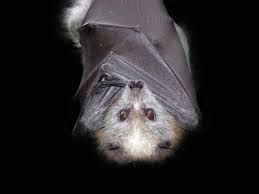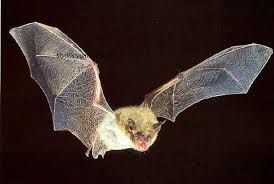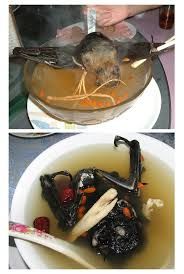
The BBC is reporting that scientists have finally discovered that bats are the hidden reservoir and transmission vector for spreading Ebola, as reported, in Guinea Ebola outbreak: Bat-eating banned to curb virus.
Guinea has banned the sale and consumption of bats to prevent the spread of the deadly Ebola virus, its health minister has said. ... Bats, a local delicacy, appeared to be the "main agents" for the Ebola outbreak in the south, Rene Lamah said.
Sixty-two people have now been killed by the virus in Guinea, with suspected cases reported in neighbouring Liberia and Sierra Leone. ... Ebola is spread by close contact. There is no known cure or vaccine. ... It kills between 25% and 90% of victims, depending on the strain of the virus, according to the World Health Organization (WHO).
People who eat the animals often boil them into a sort of spicy pepper soup, our correspondent says. The soup is sold in village stores where people gather to drink alcohol. ... Other ways of preparing the bats to eat include drying them over a fire.
The total number of deaths had reached 62 by Tuesday. Ebola is spread by contact with bodily fluids, or by touching an object recently touched by an infected person. The virus attacks the endothelial cells of the blood vessels. It takes 2 to 21 days from infection to come down with symptoms and people then can die withing days.
Two quarantine zones have been set up in southern Guinea to try to contain the outbreak. Mediecins Sans Fronieres, the World Health Organization, are providing assistance to local governments in trying to contain the epidemic.

The discovery of the bat vector has solved a puzzle that has baffled science for decades because Ebola kills off it victims so quickly it disappears for long periods so we have never known where its reservoir was. While hosting the virus the bat shows no symptoms of the disease. Livescience reports, Bat Soup Blamed as Deadly Ebola Virus Spreads.
"We discovered the vector [infectious] agent of the Ebola virus is the bat," Remy Lamah, the country’s health minister, told Bloomberg News. "We sent messages everywhere to announce the ban. People must even avoid consumption of rats and monkeys. They are very dangerous animals."
Bats are reported to be quite tasty when toasted over an open grill, or boiled down into a think and spicy soup with peppers. Mmm, mmm, good! I'm getting hungry. If it weren't for my big diet weigh in tomorrow I'd have some now. I'm down 7 pounds for the month, and don't want to go on a binge. Below the fold I offer one old American favorite bat soup recipe for the more adventuress Kossacks, although you may want to read the warning below first.
Though many animals can spread disease, bats have come under increased scientific scrutiny in recent years for their uncanny ability to host "zoonotic" viruses, that is, viruses that readily make the jump from one species to another.
"There seems to be something different about bats in terms of being able to host zoonotic infections," David Hayman, a wildlife epidemiologist at Colorado State University, told LiveScience in a 2013 interview.
The flying mammals are reservoirs for more than 60 viruses that can infect humans, and host more viruses per species than even rodents.
In addition to the Ebola virus, rabies, histoplasmosis, SARS, Nipah (which causes deadly brain fevers), Hendra (a lethal respiratory disease), Marburg, Lyssaviruses and other diseases can be spread by bats, according to the Center for Disease Control and Prevention (CDC).
One disappointing aspect of these articles is that scientist never explain to us why the custom of eating these tasty bat delicacies never spread to Europe, and the United States, leaving the reader with a puzzled empty feeling. But don't worry, to fill up that emptiness I found an American recipe for a delicious bat soup from an out of print soup. This might be your last chance to have it before it gets banned here too. Oddly, the author, and all of her descendents, as well as children, and publisher have all pasted on, but Ted Taylor and Fred Peters found an old copy in the New York Library which I've put below the fold. (Humor alert!)

Here's a tasty recipe for Fruit Bat Soup from "The New York Times Natural Foods Cookbook" by Jean Hewitt (c) 1971. (Out of Print) Courtesy of Ted Taylor who says fruit bats are also known as Flying Foxes who are affectionate little creatures who make great pets, with the advantage that you can make a tasty soup with them when you done playing.
Fruit Bat Soup</>
3 Fruit bats, well washed but neither skinned nor eviscerated,
Water
1 tb Finely sliced fresh ginger,
1 lg Onion, quartered,
The following is a genuine recipe from Micronesia. Fruit bats, or flying foxes, are furry, fruit and nectar eating bats about the size of small rabbits. The make very affectionate pets.
Sea salt to taste, Chopped scallions, Soy sauce and/or coconut cream.
1. Place the bats in a large kettle and add water to cover, the ginger, onion, and salt. Bring to the boil and cook for 40 minutes. Strain broth into a second kettle.
2. Take the bats, skin them and discard the skin. Remove meat from the bones and return meat, and any of the viscera you fancy, to the broth. Heat.
3. Serve liberally sprinkled with scallions and further seasoned with soy sauce and/or coconut cream.
Yield: 4 servings.
Mmmm, mmm! That looks like some mighty fine eating there. Unfortunately, I'm allergic to bats, but please write in and let me know how it tastes. Just remember to have your bats checked for Ebola virus, rabies, histoplasmosis, SARS, Nipah (which causes deadly brain fevers), Hendra (a lethal respiratory disease), Marburg, Lyssaviruses first. Enjoy!.
7:43 AM PT: May I call your attention to what I believe to be an important proposal for a more positive and energetic approach to supporting and appreciating our Daily Kos volunteer writers and readers who comment in
Striving towards a more nurturing, generous, supportive, fun, and successful writing culture (poll)
Also, less important for community culture but still fun for Christiegate addicts:
Isherwood asks 5 Bridgegate questions he fears may never be answered


